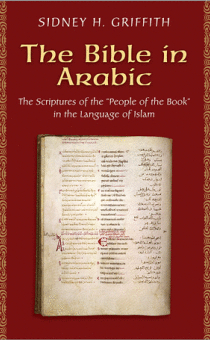Clare Wilde on Sidney H. Griffith’s The Bible in Arabic, Excerpted From Marginalia
Non-Muslims, including Jews and Christians, have spoken Arabic since before the revelation of the Qur’an. Was there an Arabic Bible before the rise of Islam? Or, did the appearance of the Arabic Qur’an shape the Arabic Bible? These are among the questions addressed in Sidney Griffith’s masterful book, The Bible in Arabic.
Although the confessional plurality of the medieval Islamic world has been the subject of significant scholarly investigation in recent years — e.g. the works of Thomas E. Burman, David Thomas, Mark Cohen, Samir Khalil Samir, Sarah Stroumsa, and Reuven Firestone) — the Arabic Bible has yet to receive its due share of attention. In The Bible in Arabic, Sidney Griffith guides us through the complexities of Jewish, Christian, and Muslim engagements with both the divine and each other as Jews and Christians came to articulate not just theology, but also their very scriptures, in the language of the Qur’an.
The Qur’an frequently mentions biblical themes and personalities, presuming its audience’s familiarity with these traditions. The qur’anic accounts, however, are not exact replicas of canonical biblical narratives. This discrepancy has provided fodder for lively polemics between and among Christians, Jews, and Muslims for centuries. On the one hand, the Qur’an insists that it confirms that which came before. The biography of Muhammad even contains accounts of Christian and Jewish recognition of the veracity of his prophethood. Detractors of Muhammad and his message, on the other hand, have claimed that a heretical Christian taught Muhammad the garbled versions of biblical stories contained in the Qur’an. The Qur’an acknowledges — and counters — this accusation by indicating that the tongue of the supposed informant is ‘ajami (foreign? accented?), while the Qur’an is in clear (lit. “clarifying”) Arabic.
If Muhammad’s detractors are correct, in what language would such an informant (or, for that matter, any of the Qur’an’s first auditors) have known the Bible? Griffith does not dispute that Jews and Christians spoke Arabic before the emergence of Islam, nor that they may have conducted liturgies in Arabic. But he does refuse to posit a written Arabic Bible before the rise of Islam. The background of this claim is his decades-long engagement with Irfan Shahid, who argues that the Gospels and Psalms existed in Arabic before the rise of Islam. Locating extant parchments from late antiquity and the early medieval period that could constitute evidence in this debate is difficult, given the usually poor condition of any manuscript of such an early provenance. Nonetheless, Griffith demonstrates how the evidence we do have “argues against [the] probability” of a pre-Islamic Arabic translation of the Bible.
Whereas the Christian Bible was translated into the languages of every people who adopted Christianity, the Arabic of the Qur’an became the language of Islamic empire. Different peoples came to adopt Arabic with the emergence of various (initially, Arab-led) Muslim dynasties and the collection and codification of the Qur’an. It was the appearance of the Arabic Qur’an, Griffith argues, that “served as one of the catalysts for both Jews and Christians to undertake Arabic translations of their scriptures.” But this was neither an immediate nor a uniform process: there is no evidence of efforts to translate the entire Bible in a single project until the sixteenth century. Jews and Christians also had different motivations for their translations. Arabic Bible translations by Jews appear to have been for scholarly interpretations or commentary, while Arabic-speaking Christians undertook translation projects in order to be able to use the Bible in the vernacular in public and official contexts.
According to Islamic tradition, the Qur’an is the word of God revealed to Muhammad in Arabic through the angel Gabriel and preserved in writing by scribes. For Muhammad is considered an ummi prophet, a term that is most commonly interpreted as “illiterate”, but may also be understood as “unable to read the languages of the Jewish and Christian scriptures”, or even “gentile.” The veracity of the Qur’an, preserved in its original Arabic version, both orally and in writing (the Arabic word “Qur’an” can be rendered in English as “reading” or “recitation”), is contrasted with the multiple biblical translations — many of which even contain different books. The Bible in Arabic, in fact, highlights the importance of Arabic translations of books of the Bible for biblical scholars, be it for the form in which the biblical text was known to its Arabic translator (in Greek, Hebrew, Syriac, etc.), or for the history of biblical exegesis, especially in response to Islam.
Read the rest of Clare Wilde‘s review over on Marginalia.


